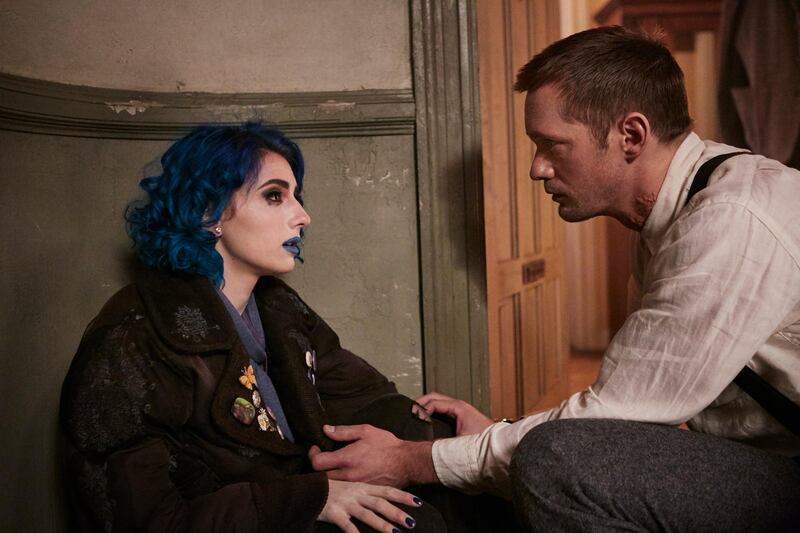Blazing a path beyond the long shadow of rock legend David Bowie is not for the faint-hearted — but for his filmmaker son Duncan Zowie Jones, it’s a challenge he’s not only accepted, but excelled at in the mind-bending arena of science fiction.
With his debut feature Moon, this gifted director not only creeped us out with a disturbing and heartbreaking tale of clones living a lie on Earth's satellite, but he won the 2009 BAFTA Award for Outstanding Debut by a British Writer, Director or Producer.
Next came Source Code in 2011, a superb brain-twister tale with dark echoes of Groundhog Day, in which Jake Gyllenhaal plays a US Army captain who has to die again and again in a simulated reality until he catches a mad bomber on a commuter train bound for Chicago.
This was enough ammo to give the 46-year-old a shot at Hollywood's holy grail, a tent-pole picture – the 2016 action fantasy Warcraft: The Beginning, with a budget of US$160 million (Dh587.2m). This went on to gross $433m worldwide to best the Prince of Persia: The Sands of Time as the highest-grossing video game adaptation of all time, despite a critical drubbing and studio disappointment after its box-office tally.
Two out of three ain't bad, as Meat Loaf sings — and Jones has bounced back big-time with Mute, his passion project of almost two decades that finally comes to fruition on Netflix this Friday.
A sci-fi mystery, Mute, transports us to a loud, often brutal Berlin of the near-future – a city Jones fondly remembers from a boyhood lived with his famous father during his years of studio partnership with American producer Tony Visconti and English musician Brian Eno in making the trilogy albums — Low, Heroes and Lodger — in the late '70s.
"Mute is an encapsulation of everything I am fascinated by; noir, science fiction, and unique people in trouble because of who and what they are," says Jones. "I'm delighted to be able to return to Berlin for the shoot, a place I lived for a period of time growing up, and I'm excited to be working with Netflix on a film that is so close to my heart."
In what is being hailed as a science-fiction Casablanca – in which East crashes against West in a city roiling with immigrants – the narrative spins about Leo Beiler (Alexander Skarsgård of True Blood and Big Little Lies), a bartender who's been unable to speak since a childhood accident at the age of 9.
Here, he frantically searches for his missing girlfriend Naadirah (German actress Seyneb Saleh), the love of his life and his salvation, through dark streets, frenzied plazas and past a seedy gauntlet of shadow-dwellers across the rotten underbelly of a bleak metropolis.
On having to carry a movie without a single line of dialogue, Skarsgård exclaims: "It's hard to not speak. Doing it, my instinct was always to say something — and I had to kind of suppress that. [My character] has been mute for 30 years, so he would obviously come up with a complete different language or way of communicating. So it was this weird feeling. I had to fight my instinct constantly."
As he seeks his answers, Leo finds himself mixed up with Cactus Bill (Paul Rudd, remembered for Ant-Man and Anchorman) and Duck (Justin Theroux, previously seen in The Leftovers and The Girl on the Train), an oddball pair of irreverent US army surgeons — whose banter reminds one of the Hawkeye Pierce and Trapper John McIntyre characters of the iconic M*A*S*H television series – on a mission all their own.
In a personal homage to his dad, Jones says his film also features many canvases Bowie painted during his time in Berlin. For Jones, leaving the silver screen for the flat-screen brought both pros and cons. In an era where Hollywood is hung up on reboots, sequels and adaptations of properties that already have a huge following through books or video games it can be hard-to-downright-impossible to finance a fresh, unique yarn like Mute.
“You can’t bring that into a big studio and kind of expect them to sign on the dotted line,” says Jones. “It’s not the kind of movies studios normally make. There used to be a time when middle-budget movies had support from the independent arms of the studios to make films in that $20 million to $40 million range. And that just disappeared. It’s gone. Dead.
"On a creative level, [Netflix] is now an outlet for different kinds of movies to get made," he told Uproxx. "So that's a huge 'pro' in the situation. The 'con' is you have to play by their rules. And as much as it hurts me sometimes to think — 'God, there's never going to be a big opening of this movie, we're never going to get the chance to show it on huge screens everywhere and do that side of it' – [there are] benefits: If Netflix hadn't picked this up it wouldn't have gotten made. That's just the truth of the matter."
In shooting his dream project, Jones bravely drew upon advice his late father gave him “about putting yourself a little bit deeper in the water than where you can reach [the bottom with] your toes.
"That's what I did with Mute," he told NME of the unexpected nature of Mute. "I made a film which was a little bit uncomfortable and unexpected, and darker than people might be expecting. I was nervous making it. But nervous in a good way."
Mute is available for streaming on Netflix from Friday
_________________
Read more:
In landmark tie-up OSN to offer Netflix content from second quarter
OSN’s new platform is kicking the door open for film-making talent from the region
Football drama 'Fan of Amoory' signals next stage of maturity for Emirati cinema
The burgeoning UAE film industry empowers the disenfranchised
_________________










